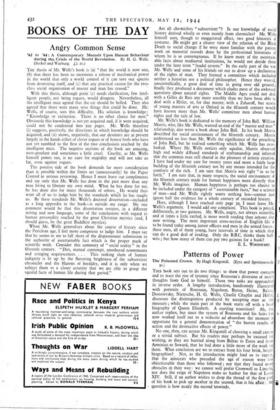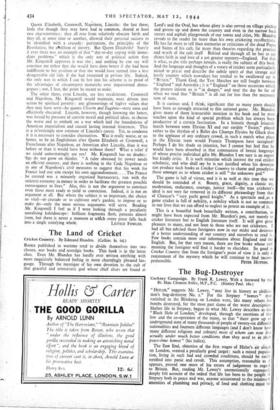Patterns of Power
THIS book sets out to do two things: to show that power corrupts and to trace the rise of tyranny since Rousseau's diversion of man', thoughts from God to himself. These two tasks are approach.d in inverse order. A lengthy introduction, handsomely illustrate with portraits of Rousseau, Napoleon, Byron, Heine, Balz Dostoievsky, Nietzsche, H. G. Wells, Charlie Chaplin and Hiticr, discusses the disintegration produced by 'accepting man as the measure ; while the main part of the book starts off with a brief biography of Queen Elizabeth. A startling transition? Ah, the author replies, but since. the system of Rousseau and his heirs has now worked itself out to a reductio ad absurdum the moment is opportune for a general demonstration of " the barren results of action and the destructive effects of power."
No one, then, can accuse Mr. Kingsmill of choosing a small canvas or a trivial subjects But his readers may perhaps be 'excused for wishing, as they are hurried along from Balzac to Essex and from Arminius. to Seward, that he had done a little more of the work for them. What conclusion are we to extract from his four brisk, bright biographies?_ Not, as the introduction might lead us to expect, that the autocrats who preceded the age of reason were loss objectionable than thOse who followed ; nor that they found more obstacles in their way : we cannot well prefer Cromwell to Lincoln, nor does the reign of Napoleon make us hanker for that of Louis XIV. Still, if an author wishes to drop the thread of the first part of his book to pick up another in the second, that is his affair : the question is how neatly the second Unwinds.
Queen Elizabeth, Cromwell, Napoleon, Lincoln: the last three, little else though they may have had in common, shared at least two characteristics: they all rose from relatively obscure birth and they all, at some time or another, allowed their personal success to be identified with a crusade : puritanism, the principles of the Revolution, the abolition of slavery. But Queen Elizabeth? Surely if ever there was an example of that " day-to-day coping with imme- diate problems " which is the only sort of political action that Mr. Kingsmill approves it was she ; and nothing he can say will convince me either that she would have done better if she had been indifferent to her position or that she would have turned into a less disagreeable old lady if she had remained in private life. Indeed, - the only way in which I can fit her into his scheme is as proof of the advantages of circumspect monarchs over impassioned dema- gogues ; not, I fear, the point he meant to make.
The other three, even Lincoln, are less recalcitrant. Cromwell and Napoleon, Mr. Kingsmill would maintain, were driven into action by spiritual poverty: any glimmerings of higher values that they may have seen—he quotes Clisson and Eugenie—were soon and effectively obscured. Lincoln, however, though knowing the better, was forced by pressure of current moral and political ideas, to choose the worse and to embark on a war which laid the foundations of American imperialism and caused lasting internal bitterness. This is a refreshingly new estimate of Lincoln's career. Yet, to condemn it it is necessary to consider alternatives. Was it really worse, or no better, to be an Englishman after Queen Elizabeth or Cromwell, a Frenchman after Napoleon, an American after Lincoln, than it was before or than it would have been without them? What a relief if we could unhesitatingly say yes! Mr. Kingsmill has no doubts: 'figs do not grow on thistles. " A ruler obsessed by power needs an efficient Country, and there is nothing in the Code Napoleon or in any of Napoleon's civil measures to suggest that his work for France had any aim except his own aggrandisement... . The France he created was a minutely organised bureaucracy, run with the strictest economy in money in order to facilitate the greatest possible extravagance in lives." Alas, this is not the argument to convince even those most ready to yield to conviction. Indeed, it is not an argument at all. But where the subject is so important, the choice so vital—to crusade or to cultivate one's garden, to impose or to make do—only the most serious arguments will serve. Reading Mr. Kingsmill I feel as if I were looking through a peculiarly tantalising kaleidoscope: brilliant fragments flash, patterns almost form, but there is never a moment at whIch every piece falls back



























 Previous page
Previous page